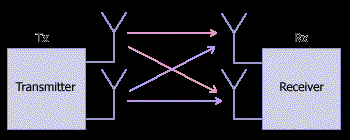MIMO Communication Systems via Convex Optimisation and Majorization Theory

Multiple-input multiple-output (MIMO) channels provide an abstract and unified representation of different physical communication systems, ranging from multi-antenna wireless channels to wireless digital subscriber line systems. They have the key property that several data streams can be simultaneously established. In general, the design of communication systems for MIMO channels is quite involved. The first diffculty lies on how to measure the global performance of such systems given the tradeoff on the performance among the different data streams. Once the problem formulation is defined, the resulting mathematical problem is typically too complicated to be optimally solved as it is a matrix-valued nonconvex optimization problem.
This design problem has been studied for the past three decades (the first papers dating back to the 1970s) motivated initially by cable systems and more recently by wireless multi-antenna systems. The approach was to choose a specific global measure of performance and then to design the system accordingly, either optimally or suboptimally, depending on the difficulty of the problem. We develop a novel unified mathematical framework for the design of point-to-point MIMO transceivers with channel state information at both sides of the link according to an arbitrary cost function as a measure of the system performance. Majorization theory is the underlying mathematical theory on which the framework hinges. It allows the transformation of the originally complicated matrix-valued nonconvex problem into a simple scalar problem. In particular, the additive majorization relation plays a key role in the design of linear MIMO transceivers (i.e., a linear precoder at the transmitter and a linear equalizer at the receiver), whereas the multiplicative majorization relation is the basis for nonlinear decision- feedback MIMO transceivers (i.e., a linear precoder at the transmitter and a decision-feedback equalizer at the receiver).
Papers
- Javier Rubio, Antonio Pascual-Iserte, Daniel P. Palomar, and Andrea Goldsmith, “Joint Optimization of Power and Data Transfer in Multiuser MIMO Systems,” IEEE Trans. on Signal Processing, vol. 65, no. 1, pp. 212-227, Jan. 2017.
- Daniel P. Palomar and Yi Jiang, MIMO Transceiver Design via Majorization Theory, Foundations and Trends® in Communications and Information Theory, Now Publishers, vol. 3, no. 4-5, 2007. [pdf] [typos]
- Jiaheng Wang and Daniel P. Palomar, “Majorization Theory with Applications in Signal Processing and Communication Systems,” in Mathematical Foundations for Signal Processing, Communications and Networking, Ch. 16, Eds. Thomas Chen, Dinesh Rajan, and Erchin Serpedin, CRC Press, 2011. [book]
- Antonio A. D’Amico, Luca Sanguinetti, and Daniel P. Palomar, “Convex Separable Problems with Linear Constraints in Signal Processing and Communications,” IEEE Trans. on Signal Processing, vol. 62, no. 22, pp. 6045-6058, Nov. 2014.
- Svante Bergman, Daniel P. Palomar, and Björn Ottersten, “Joint Bit Allocation and Precoding for MIMO Systems with Decision Feedback Detection,” IEEE Trans. on Signal Processing, vol. 57, no. 11, pp. 4509-4521, Nov. 2009.
- Daniel P. Palomar, A. Pascual-Iserte, John M. Cioffi, and Miguel A. Lagunas, “Convex Optimization Theory Applied to Joint Transmitter-Receiver Design in MIMO Channels,” in Space-Time Processing for MIMO Communications, Chapter 8, pp. 269-318, A. B. Gershman and N. Sidiropoulos, Editors, John Wiley & Sons, ISBN 0-470-01002-9, April 2005. [book]
- Daniel P. Palomar, “Unified Design of Linear Transceivers for MIMO Channels,” in Smart Antennas – State-of-the-Art, vol. 3, Chapter 18, EURASIP Hindawi Book Series on SP&C, T. Kaiser, A. Bourdoux, H. Boche, J. R. Fonollosa, J. B. Andersen, and W. Utschick, Editors, ISBN 977-5945-09-7, 2005. [book]
-
Daniel P. Palomar, “Convex Primal Decomposition for Multicarrier Linear MIMO Transceivers,” IEEE Trans. on Signal Processing, vol. 53, no. 12, pp. 4661-4674, Dec. 2005.
-
Daniel P. Palomar and Sergio Barbarossa, “Designing MIMO Communication Systems: Constellation Choice and Linear Transceiver Design,” IEEE Trans. on Signal Processing, vol. 53, no. 10, pp. 3804-3818, Oct. 2005.
-
Daniel P. Palomar, Mats Bengtsson, and Björn Ottersten, “Minimum BER Linear Transceivers for MIMO Channels via Primal Decomposition,” IEEE Trans. on Signal Processing, vol. 53, no. 8, pp. 2866-2882, Aug. 2005.
-
Daniel P. Palomar and Javier Rodriguez Fonollosa, “Practical Algorithms for a Family of Waterfilling Solutions,” IEEE Trans. on Signal Processing, vol. 53, no. 2, pp. 686-695, Feb. 2005.
-
Daniel P. Palomar, “Unified Framework for Linear MIMO Transceivers with Shaping Constraints,” IEEE Communications Letters, vol. 8, no. 12, pp. 697-699, Dec. 2004.
-
Daniel P. Palomar, Miguel Angel Lagunas, and John M. Cioffi, “Optimum Linear Joint Transmit-Receive Processing for MIMO Channels with QoS Constraints,” IEEE Trans. on Signal Processing, vol. 52, no. 5, pp. 1179-1197, May 2004.
-
Daniel P. Palomar, John M. Cioffi, and Miguel Angel Lagunas, “Joint Tx-Rx Beamforming Design for Multicarrier MIMO Channels: A Unified Framework for Convex Optimization,” IEEE Trans. on Signal Processing, vol. 51, no. 9, pp. 2381-2401, Sept. 2003.
🏆 2004 Young Author Best Paper Award by the IEEE Signal Processing Society
📈 Highly cited paper (ISI Web of Knowledge) -
Daniel P. Palomar and Miguel Angel Lagunas, “Joint Transmit-Receive Space-Time Equalization in Spatially Correlated MIMO channels: A Beamforming Approach,” IEEE Journal on Selected Areas in Communications: Special Issue on MIMO Systems and Applications, vol. 21, no. 5, pp. 730-743, June 2003.